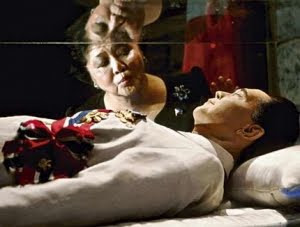
(Imelda and her deceased hubby)
10 nice things to say about Marcos On his 20th death anniversary
By Benjamin PimentelINQUIRER.net First Posted 14:52:00 09/09/2009
CALIFORNIA, United States—Seeing the massive show of love and support for Cory Aquino, Imelda Marcos reportedly expressed hope that someday her late husband also would be honored in the same way, perhaps at a state funeral. Having grown up during, and survived, the Marcos regime, Imelda’s wackiness no longer surprises me. But her wish left me with a jaw-dropping realization: They haven’t buried that dictator!?!
This month marks the 20th anniversary of Ferdinand Marcos’s death. He died in exile in Hawaii in September 1989, three years after being chased out of Malacanang. But the dictator’s remains are still lying in a refrigerated crypt somewhere up north. Someone should tell the dictator’s handlers that what he said was, “I do not intend to die,” not “I do not intend to be buried.” Still, in the spirit of reconciliation, and since we have just relived the glorious days of the People Power Revolution, bid farewell to Cory Aquino, and commemorated the martyrdom of Ninoy, it’s perhaps time to also focus on the positive side of the late strongman.Besides, it is also Marcos’s 92nd birthday (September 11) and the 37th anniversary of the imposition of Martial law (September 21). What can I say—September has really been an unlucky month for us.So allow me to present my list—and, believe me, I tried real hard to come up with these—of the 10 nice things one can say about Marcos.
1. Marcos taught us to disdain bullies. Ferdinand Marcos was not the first, or the last, president to abuse his power. But, certainly, he set a seemingly unbreakable record. The nightmare of his 21 years in power still haunts us today, a powerful, constant reminder of a chapter in our history that must never be repeated.
2. Marcos taught us to disdain leaders who flaunt their wealth. Marcos and Imelda did not invent wealth-flaunting. The elites have been doing that for generations well before he came to power, and it’s still happening today, of course. But the Marcoses certainly took the brazen display of extreme affluence, in the face of extreme poverty, to a new low. I mean how can how one justify owning 3,000 pairs of shoes?
3. Marcos taught us to be suspicious of leaders who acquire wealth. The current president just ran into this problem, of course. And the last one too. Yes, politics is still widely-considered as an easy road to easy money, but too much greed is now generally accepted as dangerous to one’s political career. And we have to give credit to Marcos for this, for making Filipinos extremely suspicious of political leaders who suddenly get rich.
4. Marcos taught us to disdain politicians who brazenly cheat in elections. Now, I said “brazenly.” For yes, election Philippine-style is still dirty. But given our experience with Marcos, there’s a line, especially in national races, that I suspect candidates will not cross for fear of sparking a severe backlash. (Or maybe not.)
5. Marcos taught us to be suspicious of leaders who warn the nation that because of some unspeakable danger to the country they simply must have more power. “Emergency powers” and “martial law” are two phrases any Philippine president must use with extreme caution nowadays. If not, you run the risk of facing ordinary Filipinos asking: “What was that again Mr./Madame President? You say the communists, the rightists, the terrorists are about to attack? Oh, and the Martians too, perhaps? And that’s why you need to throw all these people in jail, shut down all these newspapers and TV stations and kill those who say you’re a corrupt liar? Sir/Madame, I think we’ve seen this movie before. Napanood na ho ata naming ‘tong sineng ito.”
6. Marcos taught us that there is a big difference between discipline and fear. “Sa Ikauunlad ng Bayan, Disiplina ang Kailangan (For our nation to develop, we need discipline).” That was the regime’s slogan for Marcos’s New Society. It worked for a time, mainly because people knew that by discipline, the dictator meant, “Shut up and submit, or else.” It got so bad that one US official observed that the Philippines in the 70s and 80s had turned into a country of “40 million cowards and one SOB.” Well, Filipinos were willing to let that be the case only for so long.
7. Marcos showed that friendship with powerful world leaders is no guarantee that one can hold on to power indefinitely. Oh, Marcos and Imelda look so happy and proud in photographs with Ronald and Nancy Reagan. They were friends after all. Reagan even sent his Vice President George H.W. Bush to Manila to praise Marcos’ “adherence to democratic principles.” Well, a few years later, the dictator was gone after the Reagan White House finally realized he had turned into a liability.
8. Marcos taught us to be wary of leaders who try to glorify themselves in songs, slogans, or big, ugly monuments. I was actually thrilled when Marcos imposed Martial Law in 1972. I was eight years old when it happened, and for a few weeks I didn’t have to go to school and there was nothing on TV but cartoons. But then, once back in school, my schoolmates and I had to learn these new weird songs about the new order and how everything was great about the regime.
And then there’s that gigantic bust up north. I’m glad nobody blew it up as some groups reportedly planned to do. For it stands as a powerful reminder of the twisted mind that once ruled our country.
9. Marcos taught us to be creative—in fighting back. Only in the Philippines could yellow confetti become a symbol of protest. And nuns praying the rosary in front of tanks—you just won’t find such an act of defiance in other places. But even before the People Power Revolt, during the darkest days of dictatorship, Filipinos were already coming up with creative ways to defy the regime. Students at the University of the Philippines used to launch lightning rallies, in which they march from one floor of Palma Hall to another, while yelling slogans and waving banners, and then quickly putting the banners away and dispersing before the cops showed up.
Even the artists dared try new things. Take my old boss and drinking buddy, the poet Pete Lacaba, who wrote a seemingly harmless, apolitical poem titled “Prometheus Unbound.” When read vertically, the first letter of every line said, “Marcos, Hitler, Diktador, Tuta”—the famous anti-dictatorship slogan, “Marcos, Hitler, Dictator, Puppet.”
10. Marcos made us laugh and helped demonstrate that, even during dark times, Filipinos can still maintain a healthy sense of humor. Marcos and his crazy war medals. Imelda and her theory of a hole in the sky about the Philippines through which cosmic rays pass to protect the country from disaster. Admit it, Marcos and Imelda made us laugh. If it weren’t for all the people who died and suffered during the regime, we could look back to that time as funny and fun years.
Marcos and Imelda jokes kept us entertained even as we endured tyranny. And we didn’t even have cell phones back then for speedy mass distribution. I distinctly remember a classic during one of the rallies after Ninoy’s assassination and Marcos’s face often looked swollen as he reportedly battled lupus. The protest poster read: “Mamaga sana ang mukha ng nagpapatay kay Ninoy. (I hope whoever had Ninoy killed gets a swollen face).” Well, it’s funnier in Tagalog.And without Marcos, what would have happened to Willie Nepomuceno, one of the most talented Filipino humorists ever? He was so good with his Marcos impersonation, that during the critical hours of the 1986 People Power Revolt, when the dictator appeared on TV to prove he was still in charge, there were those who believed it was a ploy—with the popular comedian in the starring role.
Of course, Nepomuceno’s career faced a crisis when Marcos was kicked out of the country, and later died. But he quickly bounced back, doing other politicos, including former Presidents Fidel Ramos and Joseph Estrada. Fortunately, like the late tyrant, Willie Nepomuceno did not intend to die.
Not much of a list, but can you blame me? It’s tough to say anything nice about a dictator in a freezer.
In any case, to Marcos supporters, let me say this: There may never be a grand funeral for the late dictator, with big adoring crowds, a military honor guard, 24/7 TV coverage, and flattering commentary in media.
But don’t worry. We will never forget Marcos and what he did to our country. Ever.
 It's been hard hearing the death toll rise in Manila. The storm was worse than Katrina. The pictures and videos from the region is heartbreaking. Hundreds have died and, unfortunately, more deaths are expected. Another storm is expected this Friday.
It's been hard hearing the death toll rise in Manila. The storm was worse than Katrina. The pictures and videos from the region is heartbreaking. Hundreds have died and, unfortunately, more deaths are expected. Another storm is expected this Friday.





